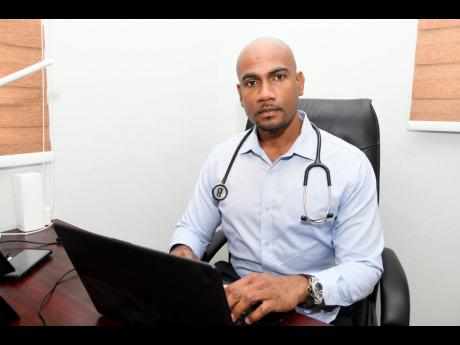Alfred Dawes | Surviving COVID-19 [Part I]
When a new virus enters a population, initially it spreads slowly then rises sharply until enough people develop immunity to block further transmission of the disease, leading to the epidemic ending. The goal, therefore, is to slow the spread of the disease, not stop it, so hospitals do not get overwhelmed. This is ‘flattening the curve’. Yet somehow, we have become fixated on the numbers of infections rather than the original goal of limiting deaths.
Worldwide, as death rates become flat or decline, the panic is driven by rising numbers of positive cases, even when they are not sick patients. Instead of focusing on the ‘deaths curve’, we call for tighter restrictions based on the ‘positive cases curve’. As these measures cripple economies, the lasting effects on poorer nations include forcing them into debt and sabotaging the education systems and social safety nets that are the only hope of lifting citizens out of poverty.
To say that Jamaica has been fairly successful with managing the COVID-19 pandemic would seem to be an affront to those who have lost loved ones and front-line workers on the brink of collapse. However, by sheer brilliance or ‘buck up’, we have managed to avoid the catastrophic events predicted by the various models put forward by experts.
Early on in the pandemic, amid the howls for a national lockdown, I postulated that the Government was not looking at the number of infections curve, but rather the number of deaths curve. Without any massive increase in deaths or hospitalisations, the economy was kept throttling with limited movement and the closure of some sectors. This, while other countries imposed severe lockdowns and restrictions.
There are raging debates about the effectiveness of these lockdowns as it has been shown that they fail to prevent excess deaths. Countries with draconian lockdowns interrupt the natural spread of the disease but when the restrictions are lifted, case numbers rise. In other countries that never had such measures, the numbers of deaths in 2020 are not very different from 2018 or 2019. This difference in deaths year on year, or excess deaths, is the real measure of the impact of the pandemic.
While European countries grapple with the decision as to sacrifice the economy or ‘countless lives’ as per the advice of the experts, Jamaica has already stumbled on the answer. Earlier, rising cases in St Catherine prompted a lockdown of that parish. However, in the midst of rising cases in Kingston and St Andrew, there are no lockdowns and the hospitals are still not overrun with patients.
COVID-19 NOT UNIVERSALLY DEADLY
Even with the post-Emancipendence and election spike in cases, the field hospital is sitting idly. Lockdowns are justified by various models showing how many millions will die if governments do not implement these measures. One expert warned that 17,000 Jamaicans could die from COVID-19. The deaths would continue until herd immunity in the population was achieved, or a vaccine was found.
In an epidemic, deaths are inevitable, but no number will be considered acceptable. However, mounting evidence suggests that fewer people will die from COVID-19 than predicted by experts. Draconian measures, while seemingly the most effective tool initially, make no sense knowing what we now know about the death rate in Jamaica.
The reality is that even as case numbers have risen, we are not seeing an equal exponential increase in the numbers of deaths. In fact, if we examine the number of excess deaths in 2020 versus 2019 and 2018 we are not seeing the effects of a ‘deadly’ pandemic. Last year, 55 Jamaicans died every day. This year, 1,452 fewer Jamaicans have died up to this point.
This has been the case in other parts of the world. In South Africa, the worst hit, and other African countries with poor health systems, the death rate is nowhere close to as high as predicted. Even in countries where the so-called second wave is resulting in rapidly increasing case numbers after eased restrictions, the death curves are not correlating. India, at close to 100,000 new cases daily, had relatively low death rates now declining. The verdict: COVID-19 is not universally deadly in all countries.
If you are concerned that Jamaica’s case count is over 8,000, then you should be deeply worried that it may be at least five times that number. With community spread, tens of thousands of Jamaicans have been exposed to or contracted the coronavirus.
VARYING DEGREES OF IMMUNITY
We were told that herd immunity would be achieved with 60 to 80 per cent of the population infected, but that price would be untold numbers of deaths. A vaccine, our only hope to return to normality.
The truth is, we already have varying degrees of immunity, not from antibodies, but by Activated T Cells. These cells kill virus-infected cells whether or not antibodies are present. It explains why some don’t develop symptoms or contract COVID-19 when exposed. It also helps to explain that, surprisingly, herd immunity may be achieved with only a 10-20 per cent infection rate.
COVID-19 will be with us for a while and we must learn to live with it rather than destroying our economies and lives in trying to avoid a theoretical scenario. We have so far avoided the loss of thousands of lives and now it’s carefully back to business with what works for Jamaica.
In Part II, I will discuss how this may be achieved with relaxed restrictions and increased testing.
Dr Alfred Dawes is a general, laparoscopic and weight loss surgeon, and medical director of Windsor Wellness Centre & Carivia Medical Ltd.; Fellow of the American College of Surgeons; former senior medical officer of the Savanna-la-Mar Public General Hospital; former president of the Jamaica Medical Doctors Association. @dr_aldawes. Email feedback to columns@gleanerjm.com and adawes@ilapmedical.com


